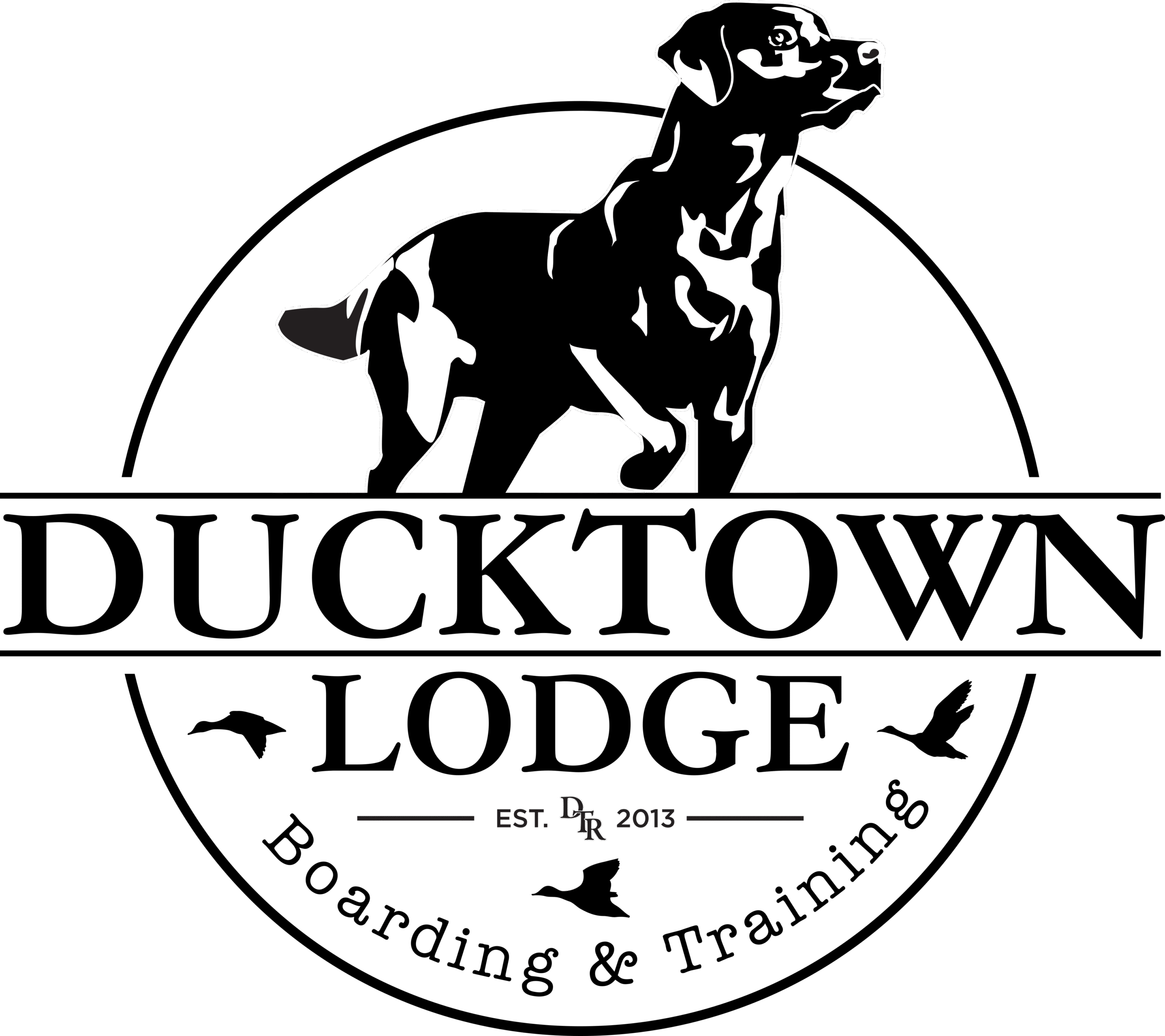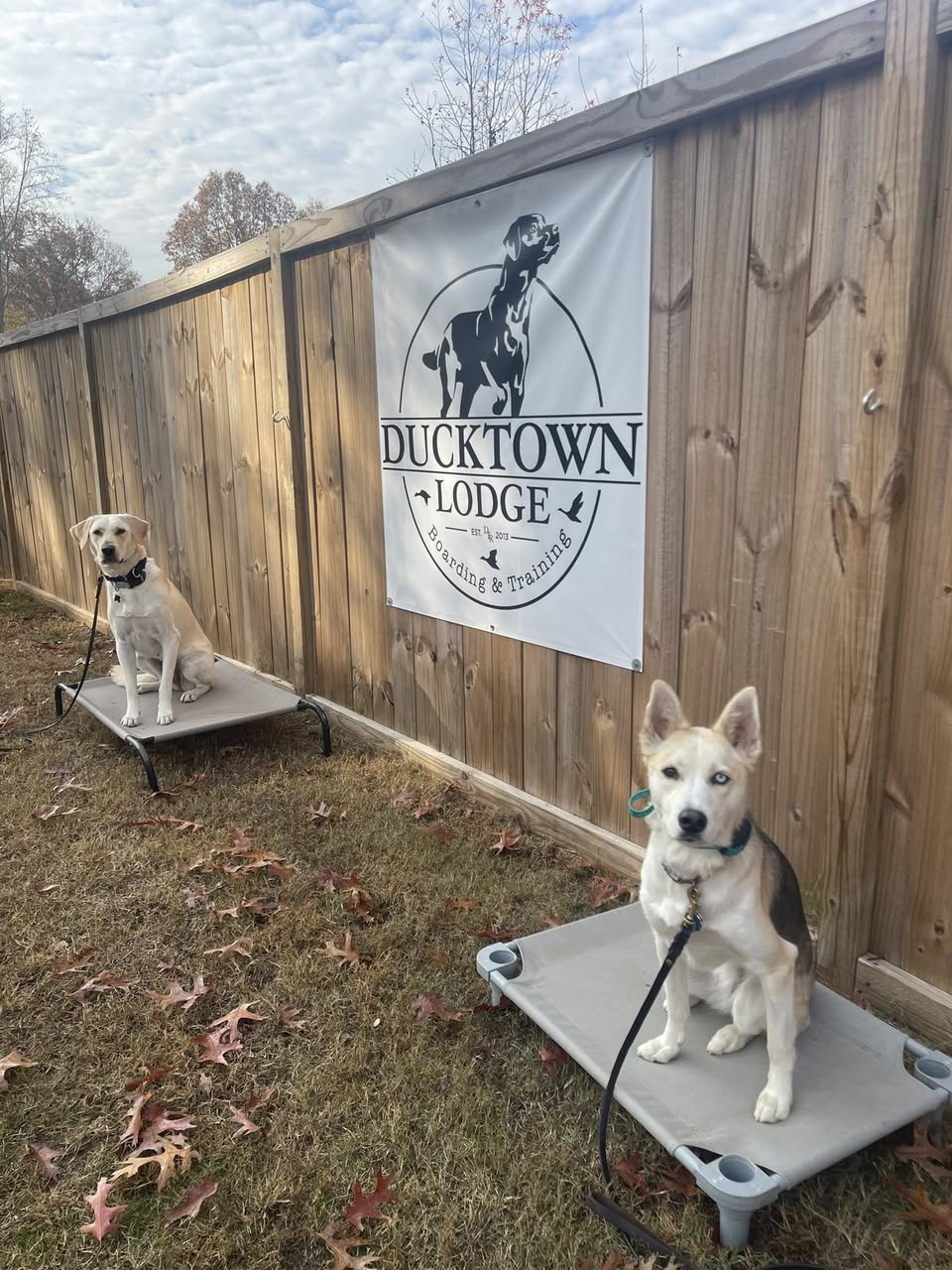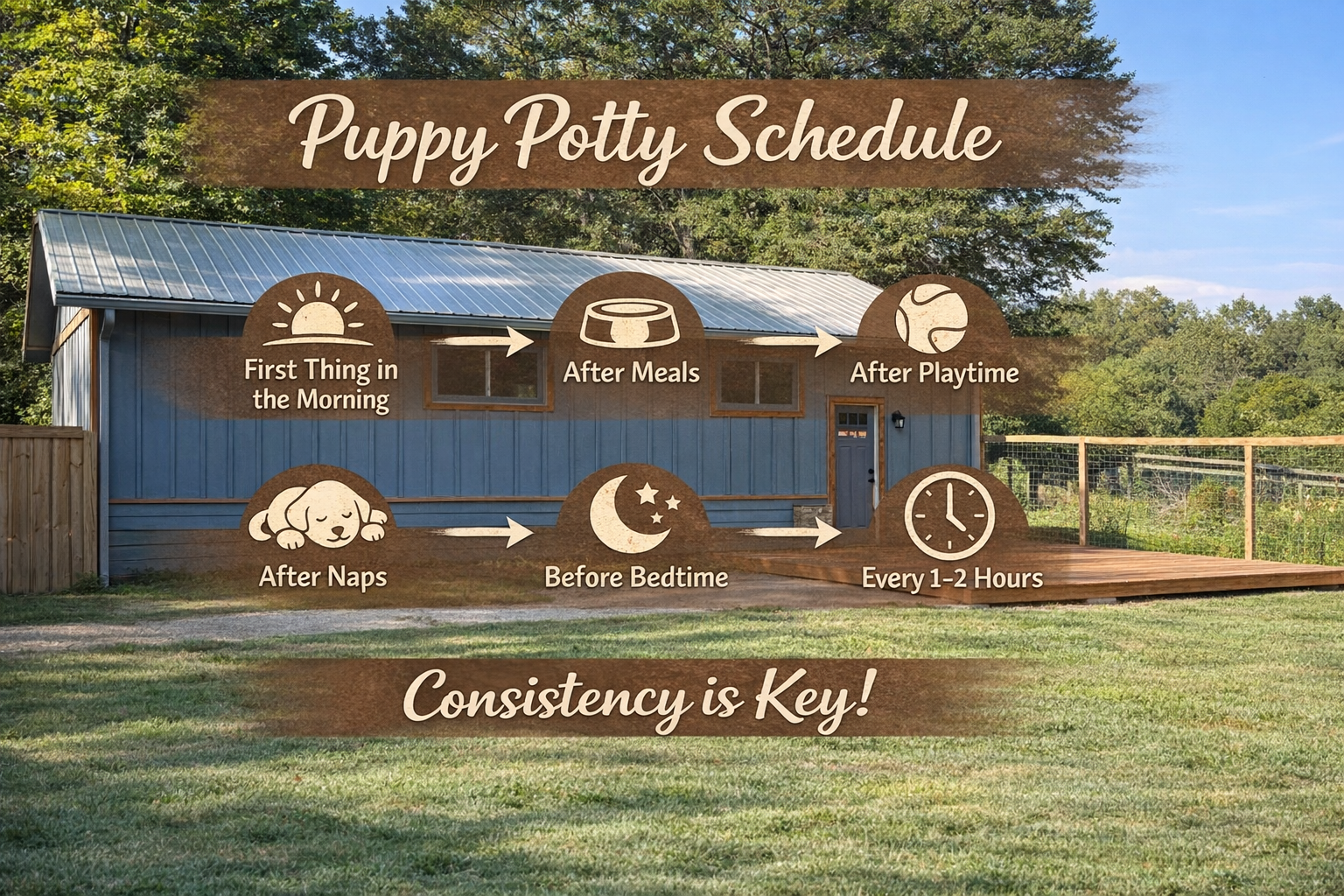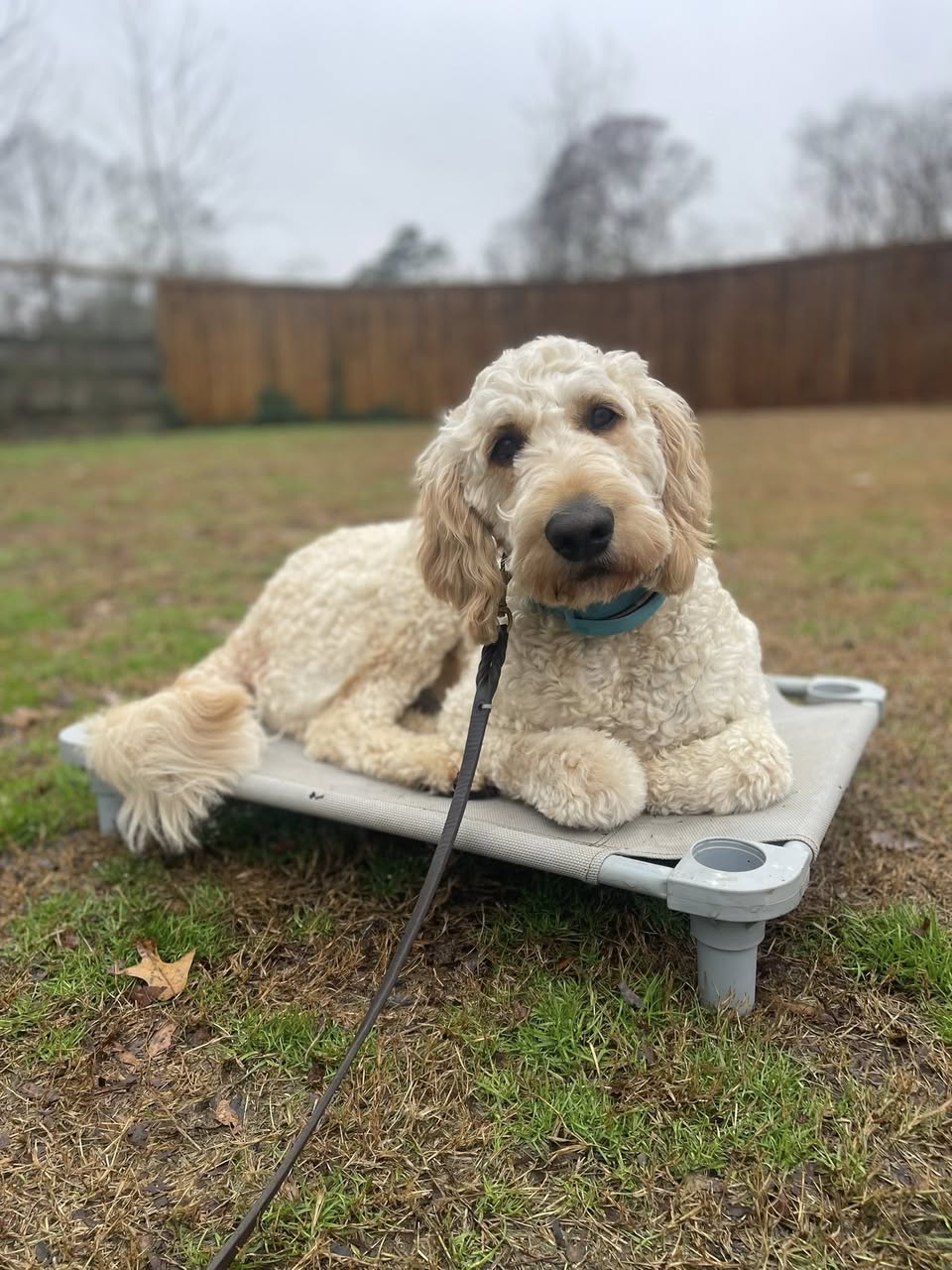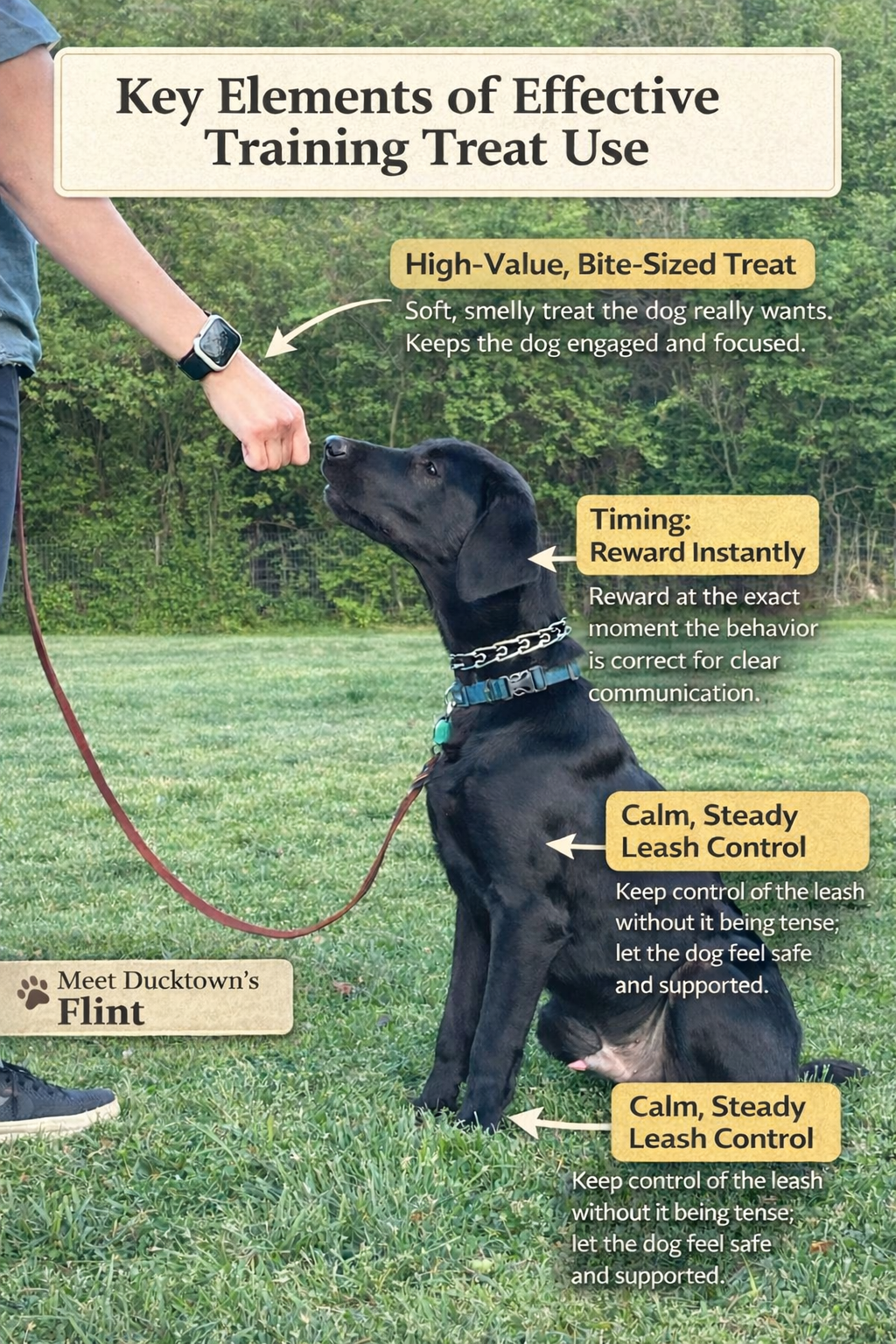A Calm Start for a Confident Future
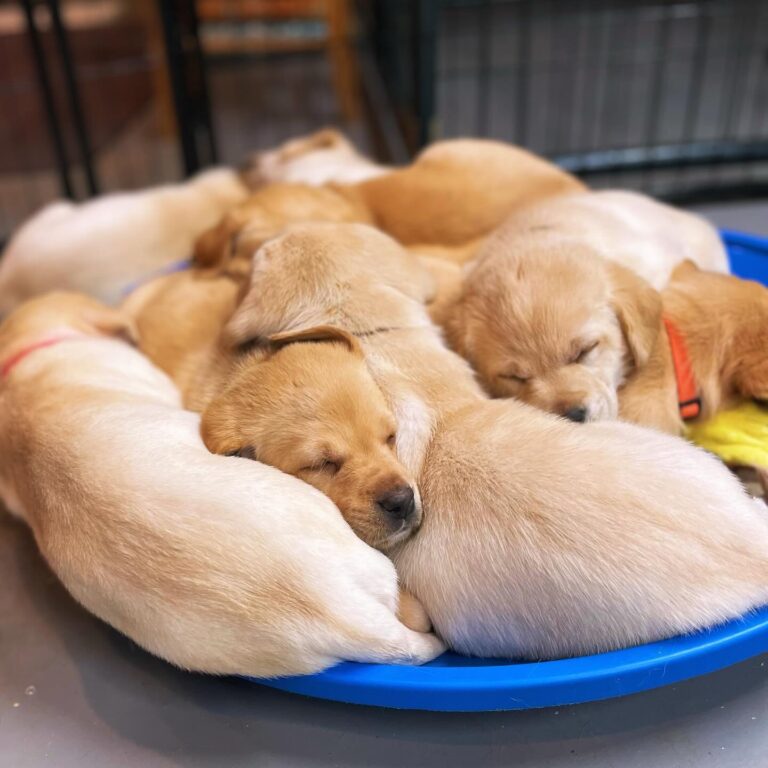
Bringing home a new puppy is one of life’s greatest joys. It’s also one of its biggest learning curves. Between housebreaking, crate training, and trying to stop the nipping and chewing, it’s easy to feel overwhelmed. At Ducktown Lodge, we understand that raising a puppy isn’t just about obedience — it’s about building trust and structure that helps your dog grow into a calm, confident companion.
The Ducktown Retrievers way blends decades of puppy-raising experience with balanced, emotionally intelligent training that helps families set healthy routines, prevent problem behaviors, and enjoy the process of raising a well-adjusted dog.
Where Balance Meets Experience
This post walks you through the same approach that started with Ducktown Retrievers — a breeding program built on love, structure, and the Puppy Culture philosophy. You’ll learn how to set routines, handle common puppy challenges, and create an environment where your puppy thrives. Whether you’re a first-time owner or adding another pup to the family, these steps will help you start strong and stay steady.
The Ducktown Retrievers Way: Where It All Began
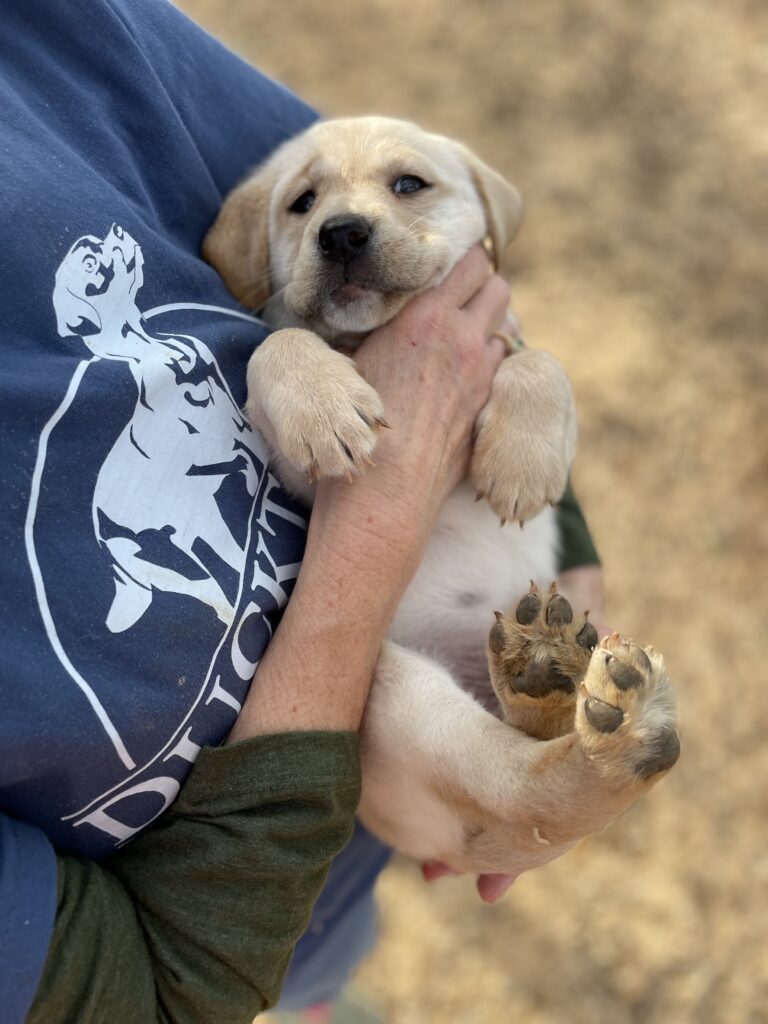
When we talk about “The Ducktown Retrievers Way,” we’re really talking about where it all started — years before Ducktown Lodge was built. Our training philosophy was born from our AKC breeding program, where we raised countless litters and helped hundreds of families bring their new puppies home.
Through that experience, we learned something essential: good behavior doesn’t just come from genetics. We are AKC Breeders and follow puppy development programs. It comes from structure, consistency, and human connection. From the first week of life, our puppies were guided through the Puppy Culture program, a developmental approach that shapes emotional intelligence through gentle exposure and calm guidance. That same foundation now runs through everything we do at Ducktown Lodge.
A well-raised puppy doesn’t just learn commands — they learn how to exist calmly in the world. We’ve seen time and time again that the earliest lessons stick the longest. The dogs who grow up with patience and predictable routines become confident adults. And for families who start with balance from the beginning, the difference is night and day.
Setting the Stage: Preparing Your Home and Mindset
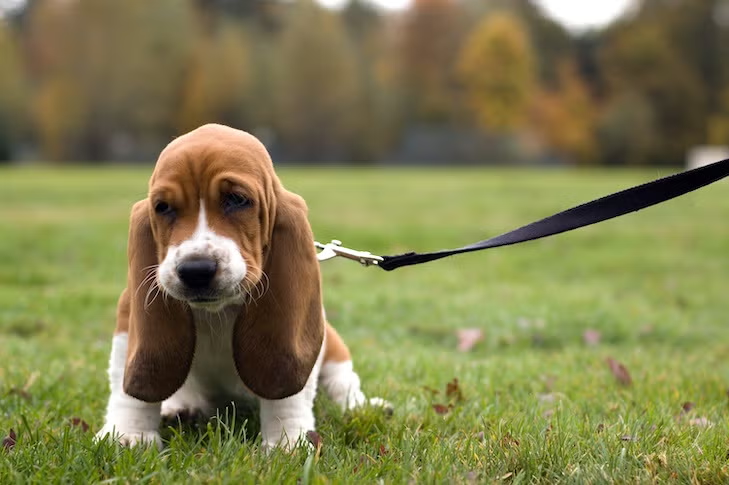
Before the first command is taught, the environment you create does most of the teaching. Puppies don’t enter your home knowing what’s safe, where to rest, or when to play — they learn that from you. The calmer and more consistent the space, the faster your puppy will settle in and start learning.
Environment and Safety
A structured space gives your puppy freedom without chaos. Think of it like setting up a nursery — it’s not about restriction, it’s about safety and predictability.
Here’s what we recommend for every new puppy home:
- Metal or Wire Crate: Choose one big enough for your puppy to stand, turn, and lie down stretched out. This becomes their “den” — a safe, calm place, not a punishment zone.
- Exercise Pen: Perfect for daytime play and nap rotation. It allows freedom while preventing accidents or bad habits.
- Baby Gates: Great for managing open spaces and keeping your puppy near you. If you have an open floor plan, a tall fireplace-style gate can safely section off an area.
- Tethers: Use short supervised tie-downs to prevent shadowing or destructive chewing while keeping your puppy close and secure.
These tools help you shape behavior before bad habits form. Puppies that can explore safely — but within limits — grow up feeling both confident and secure.
Structure Before Discipline
Many new owners wait for their puppy to “grow out of” chaos before creating structure. But just like toddlers, puppies crave boundaries — they need to know what’s expected before they can meet those expectations.
Establish a rhythm early:
- Set mealtimes and potty breaks on a predictable schedule.
- Build a bedtime routine — lights down, crate time, calm voice.
- Keep transitions steady — the same tone, the same flow every day.
This doesn’t just make training easier. It teaches your puppy that the world is safe, predictable, and kind. Structure builds confidence. Chaos builds confusion. The more consistency you create now, the more freedom your dog earns later.
The First Week Home: Puppy Training

The first week home is when everything takes shape. Your puppy is learning what life looks like — when to eat, where to rest, and how to feel safe. This stage isn’t about control; it’s about setting rhythms that help your puppy relax and trust you. The more predictable each day feels, the faster they’ll settle into their new home.
The Power of Routine – Balanced Puppy Training.
Routine is the heartbeat of a well-adjusted dog. It tells your puppy, “You’re safe. You can relax. We’ve got this.” Puppies who have predictable rhythms at home — for meals, sleep, exercise, and play — are less anxious and more focused when it’s time to learn.
Here are the core wellness routines our team follows with every puppy:
- Exercise: Keep it low-impact and short. Avoid slick floors and long walks on hard surfaces. Puppies need gentle movement to develop coordination and confidence.
- Enrichment: Provide daily opportunities to chew, sniff, and explore safely. Rotate toys, use slow feeders, and offer puzzle games that make your puppy think.
- Sleep & Rest: Puppies need 14–16 hours of sleep a day. Schedule naps in quiet areas and avoid overstimulation. A tired puppy is not the same as a well-rested one.
- Healthcare: Follow your vet’s plan for vaccinations, diet, and wellness. A healthy puppy learns better and adapts faster.
Routine doesn’t make life rigid — it makes it peaceful. It helps your puppy predict what’s next, which reduces anxiety and makes learning easier.
Building Trust Through Presence – Early Puppy Development
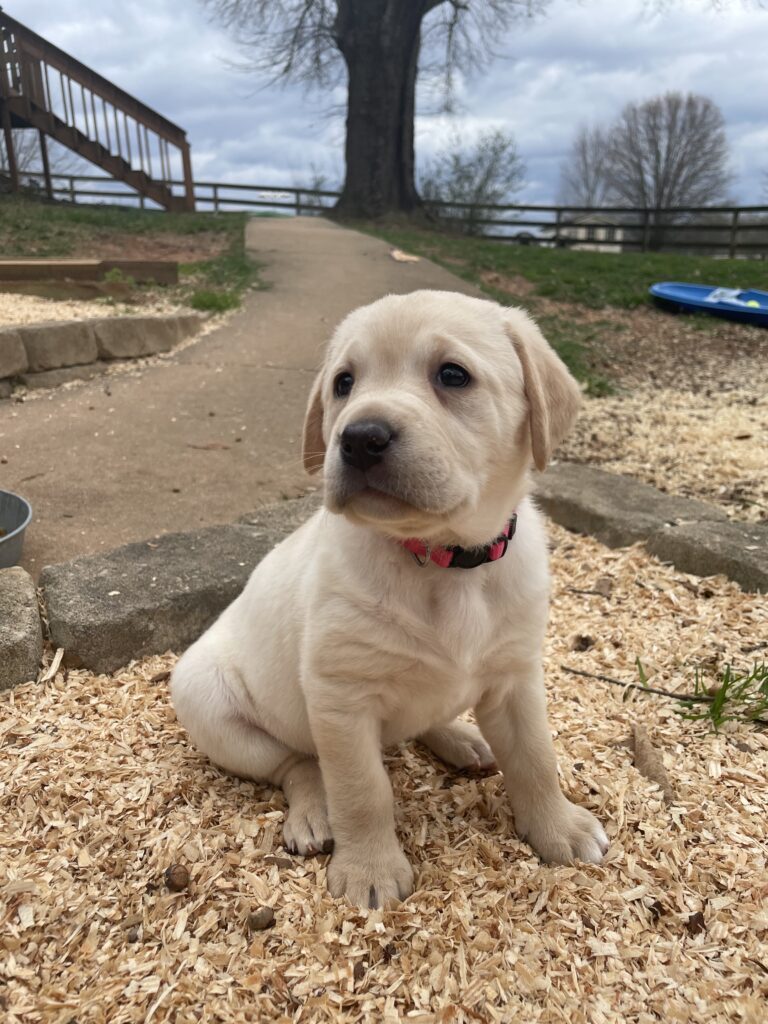
The fastest way to build your puppy’s confidence is by simply being there. In the first week, your presence means more than any command or treat. Sit nearby during crate time, guide them gently through new experiences, and reward calm curiosity.
Use this time to introduce your puppy to daily life sounds: the washing machine, doorbells, TV, footsteps, and even vacuum cleaners. Handle their paws, ears, and collar regularly so vet visits and grooming won’t cause stress later.
These small, calm exposures teach your puppy that the world isn’t scary — it’s just full of things they can learn about safely, at their own pace. By the end of the first week, you’re not just training a puppy — you’re teaching them how to feel secure in a human world.
Core Puppy Training Basics
Once your puppy begins to settle in, training naturally becomes part of the daily rhythm. The goal isn’t to create a perfectly obedient dog — it’s to build communication, trust, and mutual understanding. A puppy who feels safe will listen. A puppy who’s confused or overstimulated won’t.
House Training 101
Housebreaking is one of the first big challenges new owners face, but it’s also one of the simplest when handled with consistency. Puppies thrive on predictability, so the more routine you build around potty time, the faster it clicks.
Here’s the Ducktown way to make house training easier:
- Take them out frequently. After waking up, after eating, after playing, and every couple of hours in between.
- Use a cue word. Choose a calm, clear phrase like “go potty” and use it every time.
- Reward success instantly. Calm praise and a treat within seconds of finishing.
- Supervise or confine. If you can’t watch your puppy, use the crate or pen. Accidents happen when freedom comes too soon.
Skip punishment — it only creates confusion. Your puppy’s accidents are a communication gap, not defiance. Clear direction and routine close that gap quickly.
Crate and Boundary Training for Your New Puppy
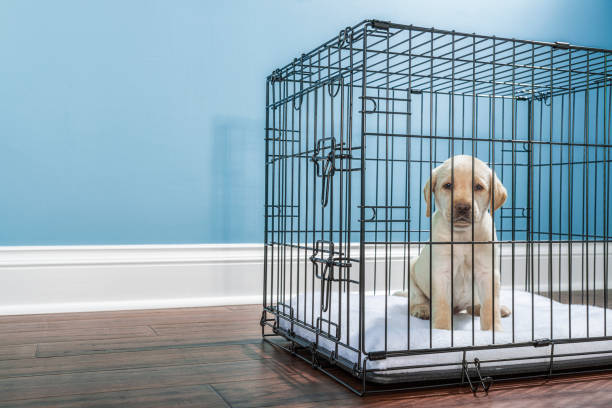
Think of the crate as your puppy’s den — a quiet, safe retreat. When introduced properly, it becomes a place they love, not fear.
Start with short, positive experiences:
- Feed meals and give favorite chews in the crate.
- Keep the door open at first, so they choose to go in on their own.
- Gradually close it for short naps while you’re nearby.
- Avoid using the crate for punishment — it should always feel safe.
Boundary training goes hand-in-hand with crate training. Use pens or gates to prevent overwhelming spaces. When puppies know where their “zone” is, they relax. Structure gives them freedom without chaos.
Early Obedience and Manners – Puppy Training North Georgia
Formal training begins with clarity, not commands. Your puppy is learning a new language, so patience and tone matter more than perfection.
Focus on short, fun sessions that last no more than five minutes. Teach foundational cues like:
- Sit – helps redirect excitement into calm focus.
- Down – builds patience and relaxation.
- Place – teaches your puppy to stay calmly on a mat or bed.
- Come – always make recall joyful and rewarding.
Keep expectations realistic. Puppies aren’t robots — they learn in waves. Some days they’ll surprise you, and other days they’ll forget everything. That’s okay. Every repetition, every calm correction, every patient moment builds the foundation for the dog you’ll have for life.
Socialization the Right Way
Socialization isn’t about taking your puppy everywhere — it’s about helping them feel safe everywhere. True socialization teaches your puppy how to navigate new experiences calmly, not just how to meet other dogs. It’s a process of slow, positive exposure that builds confidence one step at a time.
When to Get Professional Support

Even with structure and patience, puppyhood can feel like a full-time job. Some families simply need extra help — not because they’re doing anything wrong, but because they want to do things right. That’s where professional training support can make all the difference.
Why Some Families Choose Board-and-Train
A board-and-train program gives your puppy a calm, structured learning environment that’s hard to replicate at home. It’s especially helpful for busy households or for puppies who need more consistency than their owners can provide in those early months.
At Ducktown Lodge, our puppy training blends care and education seamlessly. Puppies live in the same quiet, low-volume environment as our boarding guests, but their days are filled with guided structure, gentle exposure, and individualized training. It’s not about “sending your dog away” — it’s about giving them a foundation that lasts for life.
What makes our program different:
- Only a few training dogs at a time for personal focus and attention.
- Calm, balanced techniques — never harsh, rushed, or fear-based.
- Real-life training that happens in everyday situations, not sterile rooms.
- Daily care is provided by the same consistent people who train them.
Families who use professional training early on often find that their puppies come home calmer, more confident, and easier to integrate into daily life. The learning sticks because it’s built through trust — not tension.
Partnering with a Trainer You Trust
When you’re searching for a puppy trainer, look for someone who values relationships over results. Good training doesn’t rely on shortcuts or promises of perfection. It focuses on helping you and your puppy communicate better.
Ask these questions before you commit:
- Will the same person care for and train my puppy daily?
- Do they use calm, balanced methods that focus on trust?
- Is communication with me part of the process?
- How many dogs do they train at once?
The right trainer won’t rush your dog or overwhelm you with jargon. They’ll meet both of you where you are — just like we do here at Ducktown Lodge.
Professional help isn’t about fixing a “problem dog.” It’s about preventing problems, creating structure, and setting your puppy up for lifelong confidence.
Start Your Puppy’s Journey with Confidence
If you’re ready to give your new puppy a calm, structured start, we’re here to help. At Ducktown Lodge in Cumming, GA, our approach to puppy training and early puppy development blends heart, structure, and real-world experience. From housebreaking and manners to confidence and calm, our balanced puppy training methods help families build trust from day one.
You don’t need to navigate puppyhood alone — we’ll walk beside you every step of the way.
Reach out today to talk about your dog, tour the lodge, or learn how our board-and-train programs can give your puppy the foundation they deserve.
Let’s start with a conversation — not a contract.
📞 (770) 733-0836
📧 hello@ducktownlodge.com
📍 6140 Dahlonega Highway, Cumming, GA 30928
